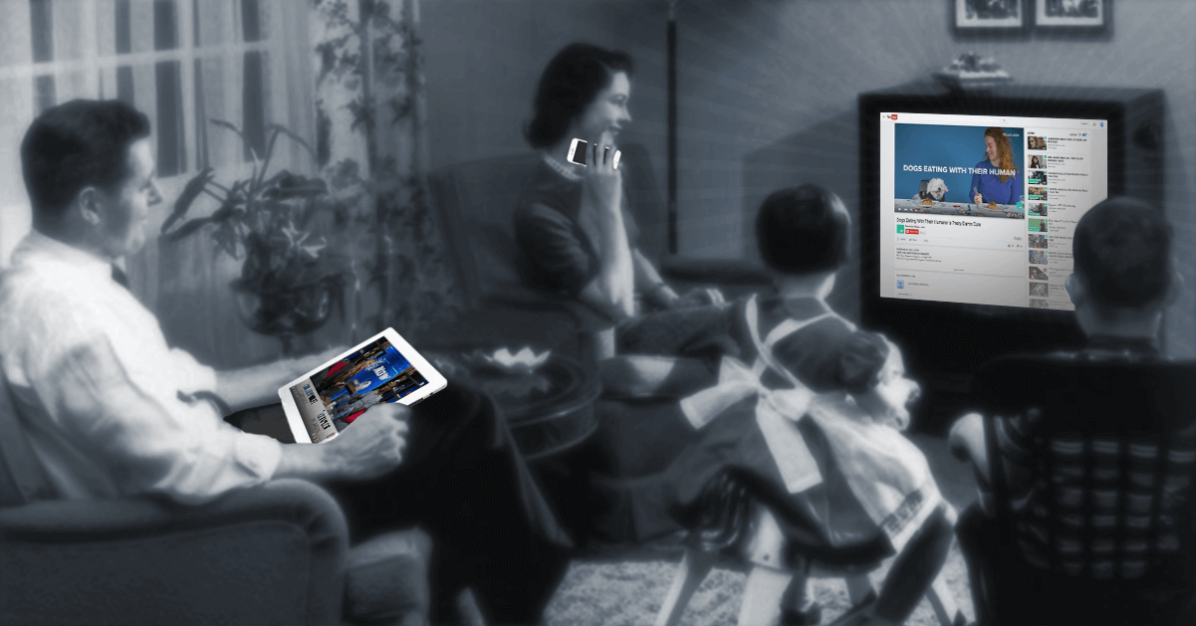Picture this: the whole family huddled around the TV, enthralled by the network entertainment programming designed for the masses.
That quaint snapshot is about as dated as the naugahyde sofa in the living room.
Today, dad would be looking at the iPad. Mom would be on her phone, and the kids would be watching YouTube on their device of choice.

Andrew Graham is at the leading edge of this shift in consumption habits; he’s a senior talent manager at Big Frame, a media company in Los Angeles with a focus on digital creators. He guides the careers of YouTube stars, including Connor Franta, Kian Lawley, Jc Caylen, Ricky Dillon, Brittani Louise Taylor, Mikey Murphy and Luke Korns. Combined, they have 16 million YouTube subscribers—that’s a lot of influence in a fragmented media universe.
Few others have Graham’s depth of insight into YouTube content, its monetization, and its ability to reach Millennials and Gen Z.
He took a brief break from star-making and brand-building to provide his thoughts on the power of YouTube, the opportunity brands have in leveraging it, and where it all goes from here.
Why is YouTube the go-to entertainment/information platform for so many Millennials, and for the generation behind them?
“The unprecedented popularity of YouTube content among youth boils down to one word: relatability. If you’re a 13-year-old boy or girl, would you rather watch content featuring people who sort of look like you, kinda sound like you, and are going through experiences somewhat like yours? Or, would you rather watch people who look exactly like you, sound precisely like you and are talking about hyper-relevant experiences from their bedroom? Chances are, the latter: it’s more “relatable.” The greater entertainment industry spends a lot of time discussing how technology is driving a shift in youth culture when, in reality, technology is only half of what’s going on. The very content Millennials, and now Gen Z, are engaging in is inherently different from what traditional TV programmers are distributing. A Variety study from the spring of last year underscores this well, concluding that Millennials find YouTube content more entertaining and relatable than TV.”
Do you see YouTube becoming what traditional TV has been for the past 50 years?
“I do not see YouTube becoming a programmer like traditional broadcasters; however, YouTube has a unique opportunity to convert its massive footprint into a niche SVOD (subscription video-on-demand) à la Hulu, Amazon and Netflix. YouTube has made it pretty clear that its core business is a user-generated platform, but that’s not to say that O&O premium content might play a larger role in the future as YouTube Red scales.”
Users have largely become accustomed to consuming free online content. What does that mean for YouTube Red?
“Audiences have become accustomed to consuming content for free online but they’ve also become habituated to watching advertising. YouTube Red is betting not only on original content, but also on the promise of an ad-free environment to bring in paying subscribers. In order for YouTube Red to succeed, YouTube will need an incredible slate of original programming (featuring not only YouTubers but also traditional actors) that defines a clear brand, voice and perspective. YouTube also will need to spend marketing dollars in a smart way. The ‘build it and they will come’ dynamic doesn’t work, even when you’re YouTube. I’d look for YouTube to be spending coin not only on digital, but also traditional.”
What does it take to be a YouTube “star”?
“What’s below is a gross generalization, but it takes a few key things to be a YouTube star: work ethic/perseverance, excellent content, diversification of platforms and best-in-breed team.
- Work ethic and perseverance: One of the most seductive things about YouTube stardom is the assumption that it’s easy. These stars are, after all, displaying “relatability,” that they’re just like you. Success on YouTube not only means doing the hard work of regularly programming (at least one video a week + responding to comments) but occasionally failing in front of the whole world. It’s a big stage and there are lots of haters; you need to have tough skin and persevere. Even once you do catch traction, it’s not a windfall of money.
- Excellent content: Assuming you’re programming at least one video per week and taking the worthwhile criticism in stride while ignoring the haters, you still need to have a best-in-class barometer for what is, yes, again…relatable. This isn’t just a word kicked around by industry folk; it’s a word embraced by the generation who actually consumes this content. Just as Aaron Sorkin might judge a script by the quality of the narrative and prose, my clients and their audiences judge the quality of content based on how “relatable” it is. They actually use this term when commenting on content. If a certain video, tweet, Instagram, Snap or Vine doesn’t perform, it is generally considered unrelatable.
- Diversification of platforms: It’s not enough to have a following on YouTube. In this age, you need to be omnipresent and have programming across all major social networks: Facebook, Instagram, Twitter, Vine, Snapchat and whatever the heck pops up next. Music.ly? YouTube is just the tip of the phalanx.
- Best-in-breed team: Once talent has hit escape velocity, they need a team around them to support not only their core digital business but their other entrepreneurial endeavors—talent agents for those who want to break into acting, business managers to help set up new businesses, publicists to help add a spotlight and rocket fuel to the exciting work, and a manager to help make sure all parties are on track. If you want to go fast, go alone. If you want to go far, go together. You need a team.”
What do you look for when seeking out/representing such talent?
“When scouting talent who is native to digital, I generally look for the same things any rep looks for: do you have some heat/traction? Are you a hard worker who will show up on time and row in the same direction? Do we have chemistry (management is all about partnership)? Do I see a path to help build you into more than a personality on YouTube (my clients are diversified—feature films, NY Times best-selling authors, clothing designers, musicians) because it’s not enough to be just one thing.”
Do some brands discount YouTube as an advertising channel? If so, why?
“Lots of brands are still in the dark ages and unwilling to jump at “influencers” on YouTube. I think there’s a real temptation to stick to the status quo if you have an older team running your account. There’s a lot of, “I’m 50, I’ve got two more kids to put through college. I don’t want to rock the boat. Should a campaign tank, at least it tanked based on something that’s worked in the past. I won’t be laughed out of my job.” There’s also a general fear of what is unknown. There are plenty of brand managers who are unfamiliar with these “new” channels, and as a result, fear them and refuse to engage.”
Which brands/companies are doing YouTube advertising “the right way?”
“Taco Bell has always impressed me with engaging talent early in their careers—finding folks on the brink and then offering them modest endorsement deals and unique access to desired events like the VMAs, Grammys, etc. Kia has done a lot of music video work with talented musical influencers, the Art Institute did a great series with Connor Franta and the Ford Motor Company has done great cinematic work with DevinSuperTramp.”
Is there a more effective platform than YouTube when it comes to reaching younger demos?
“If I had to make a generalization about engagement, I would say that YouTube is the stickiest platform among youth. But YouTube is just one gear in the youth engagement machine. To comprehensively engage with younger demos requires strategies across numerous channels (Twitter, Instagram, Vine, etc.).”
How much of a threat does Facebook pose to YouTube?
“Until Facebook creates a scaled, natively monetized program for users to earn money from their content, it poses little threat to YouTube. While Facebook may compete for digital ad dollars, its products are pretty separated.”
YouTube turned ten years-old this year. What do you envision for YouTube in another decade?
“I look forward to a scaled subscription business from YouTube, a robust originals and licensed business and hopefully a few competitors. I also anticipate you’ll see some incredible talent-driven O&O brands coming from voices that originate on YouTube. There will be more and more businesses à la ipsy from Michelle Phan. This last point is what excites me most about this space: converting owned distribution into new brands and companies. Connor Franta and I have been focusing on this strategy with Heard Well, and now Common Culture.”
